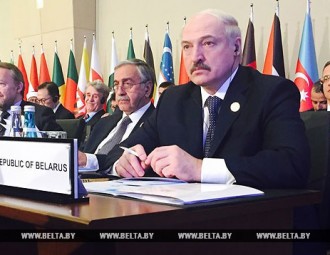The official Minsk wants to get an observer status in OIC
 Belta
Belta
Lukashenka spoke at the summit of the Organization of Islamic Cooperation.
On April 15 Aliaksandr Lukashenka spoke at the summit of the Organization of Islamic Cooperation (OIC) in Istanbul.
“Approaches and priorities of Belarus and the OIC in the international scene coincide a lot particularly in such areas as family values, religious tolerance, sustainable development, and human rights,” – said the Belarusian head of state.
“The interest in the enhancement of the ties with the Islamic world is an absolutely conscious choice of Belarus. By implementing the multi-vector policy and being open to the external world, by not willing to be constrained in the narrow bounds of Eurocentrism at the end of 1990s we became the only full-fledged member of the Non-Aligned Movement among all European countries at that moment in time,” BelTA quotes the President.
Aliaksandr Lukashenka emphasized that the representatives of various religions live in peace with each other in Belarus:
“We are proud of the fact that there have never been any interethnic or religious conflicts in Belarus. It was made possible because of the consistent promotion of the ideas of tolerance, peaceful and harmonious co-existence of various nationalities and religious denominations,” the President remarked.
“It is deeply symbolic that I can tell you about an important event for all Belarusian Muslims at this high-profile forum in Istanbul. The construction of the Cathedral Mosque will be completed in the Belarusian capital in the near future,” the Belarusian leader added.
“I believe that taking into account the advanced level of our trustful relations with many Muslim countries and the affinity of views on fundamental international matters granting the OIC observer status to Belarus would be the next logical step that would bring about new opportunities for advancing mutually beneficial cooperation,” stated Aliaksandr Lukashenka. He assured that Muslim countries will always find a reliable and predictable partner in Belarus. According to the head of state, Belarus shares the OIC's universal principles of non-interference with domestic affairs of sovereign nations and respect for their territorial integrity. Belarus is against employing force and is in favor of resolving conflicts by peaceful means.
New opportunities for advancing mutually beneficial contacts will emerge thanks to Belarus' acquisition of the observer status in the Organization of Islamic Cooperation (OIC), Aliaksandr Lukashenka is convinced.
-
03.01
-
07.10
-
22.09
-
17.08
-
12.08
-
30.09








































